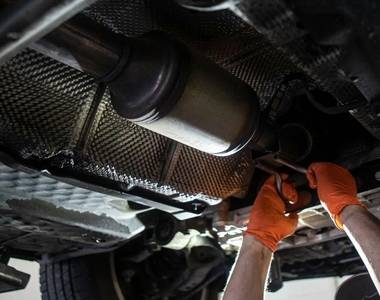UK road tax is mandatory for all car owners, even those who are tax-exempt. When you’re selling your car, there are a few important steps to take to comply with road tax regulations. In this article, we’ll cover everything you need to know about how to handle road tax when transferring ownership of your vehicle.
Road tax (also known as vehicle excise duty or VED) is a fee paid to the UK’s Driver and Vehicle Licensing Agency (DVLA). This agency collects road tax payments, which are used to help maintain roads and bridges throughout the country.
The UK calculates road tax based on the type of vehicle you own and how much CO2 it emits. Every vehicle owner (except those exempt) pay it annually or biannually. And if you drive without taxing your vehicle first, the DVLA can fine you up to £1,000.
If you're selling or transferring ownership of your car, it's important to ensure that the road tax is taken care of properly. And trust us, it's a little complicated.
What happens to road tax when you sell a car?
Since you pay road tax for the year upfront, you're probably wondering what happens to it when you sell your car. Well, the short answer is that the current registered keeper (you) is responsible for the road tax until the moment of sale, at which point responsibility passes to the new owner.
Historically, road tax was transferable from one owner to the next. Since October 2014, the UK government changed the rules and made road tax non-transferrable. This means that you, as the seller, cannot transfer your road tax to the new owner when selling your car.
Road tax when selling a car
When you notify the DVLA you've sold your car, they will automatically know to issue you a refund for the road tax. You'll receive a cheque in the post for any full months of tax your car has left.
Before the government scrapped paper tax discs, there used to be a five-day grace period for transferring road tax. This was meant to make it easier for anyone who applied online and had to wait for it to come in the post. With the new digital system, your buyer must tax the car at the point of sale. Otherwise, they're subject to a fine if they drive off without it.
You shouldn't notify the DVLA at any point before the ownership has been officially transferred. Doing so could result in an unwanted fine — it's illegal to drive, park or keep a vehicle on the road without road tax.
Road tax when buying a car
To understand road tax in its entirety, it helps to put yourself in your buyer's shoes.
No matter what, your buyer will be responsible for new tax when they register the vehicle. To help with the sale process, you should have information ready regarding your vehicle's emissions (it's on your MOT certificate). That way, they can understand roundabout vehicle tax costs.
Your buyer must purchase and pay for their own road tax before they can legally drive on public roads. They can do this by registering with the DVLA online using the 12-digit reference number on the V5C/2 document you give them.
You can't legally drive an untaxed vehicle on public roads, which is where things get complicated for your buyer. They can't tax the car until they're the new registered keeper. So they cannot (legally) pick up the car from you and drive it home. They also can't park it on public roads.
If you're selling your car to a private buyer, this means you have to accept payment, transfer ownership (give them their green slip) and wait for their new tax to come through before they can pick up the car.
Is it possible to sell your car when it has road tax?
As we mentioned, it is completely possible to sell your car with road tax. In fact, you will unlikely sell your car on the exact date your tax runs out.
As the seller, you are responsible for the road tax until the point of sale — and you can pass that responsibility onto the buyer once they become the new registered keeper.
This means there are a few often-overlooked but critical details to remember when selling your car:
- Your buyer must tax the vehicle and complete the transfer of ownership process while they meet you to buy it.
- You must cancel your vehicle tax on the same day you complete the sale.
- Since they cannot tax it without insurance, your buyer must have a policy set up on or before the day they complete the purchase.
How to get a tax refund when you sell your car
Getting a tax refund when you sell your car is an automatic process. Once the DVLA knows you have sold your car, they will remove your tax liability and mail you a cheque for the full months remaining.
Let's take a look at how each step plays out.
Gather relevant documents
First and foremost, you need to gather your relevant documents. There are several documents required to sell your vehicle. The two most important ones for tax refund purposes are your V5C and your MOT certificate.
- V5C logbook — Your V5C logbook is what your buyer will use to tax their vehicle, so it's the most important part of the transaction. You can sell your car without a V5C, but it's a million times more complicated, given the intricacies of tax law. Getting a new V5C is easy — you can complete the process on the DVLA website in a few minutes.
- MOT certificate — Your MOT is a required document for sale, and it proves your vehicle is safe to drive on the roads. There is also a way to sell your car without an MOT, but the new owner will need it to tax their vehicle.
Determine your tax liability
The DVLA will figure out how much to pay you back via their online service, but you can figure out roughly how much you are owed by looking at your V5C and your MOT certificate.
- Your V5C will tell you when your vehicle tax is due — this is the date when it ends and you become eligible for a refund for every full month from now until then.
- Your MOT certificate will show your car's CO2 emissions, which determine the amount of road tax you owe for the year.
All you have to do is divide the annual cost of your vehicle tax by 12 and multiply it by the number of full months you have left in the year. That's how much you will get back from the DVLA once they process your refund.
Notify the DVLA
Once you have everything in order, you can notify the DVLA. This service is only available between 7 a.m. and 7 p.m., so make sure you have the time to do it between those hours.
The notification process is simple:
- Navigate to the DVLA website.
- Complete the steps required by filling in the necessary information.
- Provide your buyer's details.
- Pay by credit card, debit card, or direct debit.
Once you've paid, the system will automatically remove you as the registered keeper. Then, your buyer can tax the car using the V5C/2. The DVLA will send you a cheque for the full months of tax your car has left.
This means if you're selling your car online or to a dealership (which will notify the DVLA on your behalf), you don't have to worry. You'll get the refund (though it doesn't hurt to verify).
Cancel your car insurance
After everything is sorted with the DVLA, cancel your car insurance policy. You don't want to do this before selling. Even if you aren't driving, you still want insurance cover for potential damage and theft.
If you're buying a new car, some insurance providers will allow you to transfer the policy over. If you do this, keep in mind your rate will fluctuate based on the type of vehicle you buy.
Inform HM Revenue & Customs (HMRC) (if applicable)
If you're selling a private car, you are exempt from capital gains tax (CGT) in the UK. However, if you are selling a van, sports car, commercial or business vehicle, you must report your sale to HMRC.
HMRC will need to know your vehicle’s registration number, the date of sale and the price you sold it for. HMRC will charge you capital gains tax depending on how much money you made from the sale (if any).
Wrapping up
Unless you're selling a salvage car (or selling a non-running car to a scrap yard) you will almost certainly run into the problem of selling a car with road tax. The good news is that, as long as you follow the processes outlined here, it's not too difficult to accomplish. The most important thing to remember is to cancel your road tax the same day as the sale and make sure your buyer doesn't drive off before taxing it on their end.
Want to learn more? These are the questions our sellers ask us the most.
How many cars can I sell without paying tax in the UK?
You can sell as many "private cars" as you like without paying tax on the sale because the UK considers these wasted assets. If you're selling a commercial or business vehicle (i.e., vans, sports cars), however, the sale will be subject to capital gains tax every time. You must report the sale to HMRC.
Who pays vehicle tax in the UK?
Everyone must tax their vehicle in the UK, but not everyone has to pay. Tax-exempt groups include those who can claim disability, disabled passenger vehicles, "historic" vehicles (those made before 1 January 1983), fully-electric vehicles, and SORNs.
Is vehicle tax the same as road tax in the UK?
Vehicle tax and road tax are two words, often used interchangeably. They both refer to the tax you must pay yearly for your vehicle to be registered and legally used on the road. The amount differs depending on engine size and CO2 emissions of your car.
How is road tax calculated for a sold vehicle?
The DVLA will calculate the road tax you have to pay based on CO2 emissions. The tax rate differs for pre-2017 vehicle models. Generally, the higher the emissions, the more you have to pay.
Is it the seller's responsibility to update the road tax before selling the car?
The seller must notify the DVLA as soon as they sell their vehicle. This initiates the official ownership transfer and the DVLA sends the new owner their V5C logbook. In doing so, they also tell the DVLA to remove themselves from the vehicle tax register and send a tax refund.
Are there any penalties for selling a car without a valid road tax?
Technically, no. But you cannot drive a vehicle without road tax, so the buyer will not be able to use it until they tax the vehicle on their end. At the time of sale, the buyer must tax the vehicle to be able to drive it. Failing to do this can lead to fines and other penalties.











